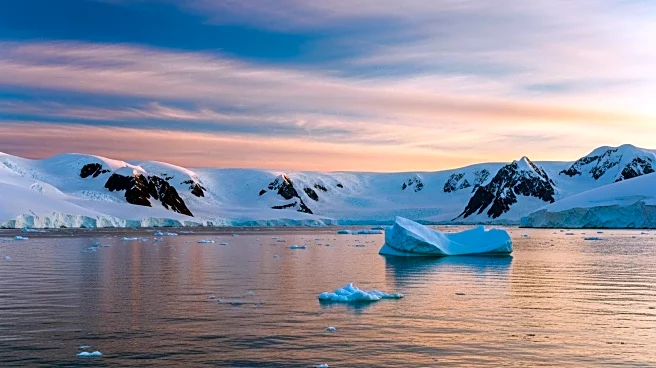What's Happening?
A recent study published in the journal Nature highlights significant and rapid changes occurring in Antarctica, which could have dire consequences for global sea levels. The research, led by climate scientist Nerilie Abram, reveals a series of abrupt changes in the region, including a dramatic loss of sea ice over the past decade. These changes are interconnected, with one alteration exacerbating others, potentially pushing Antarctica past a critical threshold. The study emphasizes the role of human-induced climate change in accelerating these shifts, noting that decisions made regarding greenhouse gas emissions in the coming years will be crucial in determining long-term impacts.
Why It's Important?
The rapid changes in Antarctica are significant because they threaten to raise global sea levels, potentially flooding coastal cities worldwide. The loss of sea ice in Antarctica has been occurring at a rate much faster than in the Arctic, indicating a shift in the region's stability. This development underscores the urgent need for global action on climate change, as the choices made now will have lasting effects on the planet's future. The study serves as a stark reminder of the interconnectedness of Earth's systems and the global consequences of regional environmental changes.
What's Next?
Further research is needed to understand whether the current changes in Antarctica represent a fundamental shift in the region's climate dynamics. Scientists will continue to monitor the situation closely, gathering more data to assess the long-term implications. Meanwhile, policymakers and environmental groups may increase efforts to mitigate climate change by advocating for reduced greenhouse gas emissions and promoting sustainable practices. The findings could also influence international climate agreements and strategies aimed at preserving polar regions.
Beyond the Headlines
The study highlights the ethical responsibility of current generations to address climate change proactively. The potential irreversible changes in Antarctica raise questions about humanity's role in altering natural systems and the moral obligation to protect vulnerable environments. Additionally, the research may prompt discussions on the legal and cultural implications of climate-induced displacement, as rising sea levels threaten communities worldwide.









